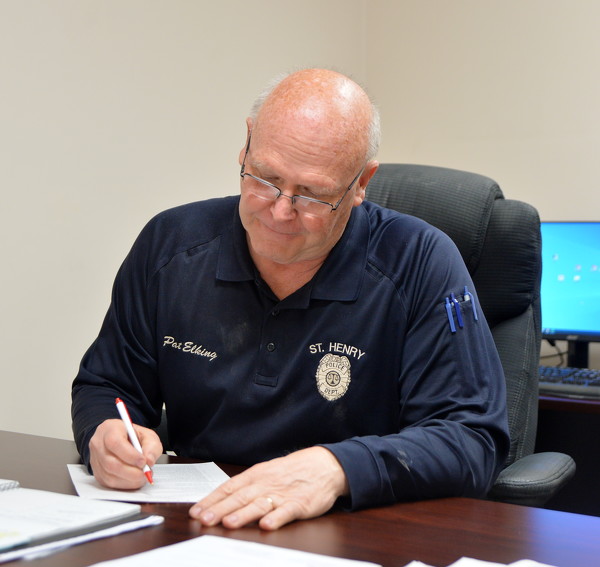Monday, May 9th, 2022
'People' cop liked working the late shift
St. Henry police officer Elking announced his retirement
By William Kincaid

Photo by Paige Sutter/The Daily Standard
St. Henry police officer Pat Elking working at his desk. Elking has announced his retirement.
ST. HENRY - Officer Pat Elking's lengthy career in law enforcement came to an end late last month as he retired from the St. Henry Police Department.
The Chickasaw native's fascination with people led him to ascend the ranks of the Mercer County Sheriff's Office before joining the St. Henry Police Department.
Wearing a badge for nearly five decades, Elking investigated cases spanning the criminal spectrum from the mundane to the most severe. Yet Elking bears no trace of fatigue or cynicism.
In fact, Elking, a proud husband, father and grandfather, is cheerful, funny and filled with joy. Asked how he avoided becoming hardboiled - having seen it all - Elking credits his time spent as a zoning inspector, coach and summer sports coordinator of the village of St. Henry as giving him balance and a positive frame of reference.
"You'd be amazed at how young young kids will keep you because they know the latest things," he said. "They're just a blast to talk to because they're just little kids, and the nice thing is it really did keep policing in perspective."
Watching the kids have so much fun reminded Elking that the world isn't such a bad place, he said. Coaching, he believes, also kept him relatable to outside the purview of law enforcement. Elking coached junior high football for 25 years, and girls softball teams for 12 years.
Longtime colleague Kip Wright said Elking has a way of connecting with people in a very fundamental way, especially with children. He gets down to their level, asking them about their favorite color or pet before asking questions about a case he's investigating.
"Pat has a great reputation for being able to interview," Wright said. "The main thing is to try to keep people feeling as comfortable as they can whether they're a witness, a perpetrator, a parent, and I learned a lot of that from Pat Elking - halfway through my career."
The world isn't full of good people and bad people, Elking said. He asserted there are a billion shades of grey in between, and those who commit crimes aren't necessarily bad. They've made a mistake like everyone else, albeit in a way involving peace officers, he said.
"Unlike TV, in a small county like this you arrest the same people over and over and after a while you become friends with them," Elking said. "I'll bet between Kip and me I would estimate 80 to 90 percent of the people that we've arrested, if we saw them walking down the street, we would be more than happy to talk to them and them to us because they really are nice people."
Elking said he's even arrested guys who he considered his friends.
"Look for the long run. Get to know these people. Get them to know you," he said.
His fascination with people led him to law enforcement in the first place when he joined the sheriff's office in 1976. Officers and detectives essentially are amateur psychologists, a notion that Elking found greatly appealing.
"I just wanted to do something that wasn't the same thing every day," he said. "And the one nice thing about this job, if you want to meet different people … you get to meet all sorts and that's the neatest thing that Kip and I will miss for the rest of our lives, talking to people, the victims, the offenders."
Elking spent his first year as a dispatcher and jailer.
"When you're 18, just turning 19 and you're from Chickasaw, you're backwards. You don't see much of the world and it kind of opened up my eyes but it was interesting," he said.
He quickly moved up the ladder.
"I got hired and then because of people retiring and quitting, myself and another jailer/dispatcher were promoted to deputy and at that time you had a year to complete your basic training which was like 300 hours worth," Elking said.
He worked the road for three years, chiefly responding to calls for assistance.
"Things were different back then. We rotated days off and rotated shifts," Elking said. "One month you were working evenings, the next month you worked days and the next month you worked midnights."
It was those late-night, early-morning shifts that Elking found most intriguing.
"That's when you really get to see people as they are, not the veneer they tend to put on given the chance," he said.
"Working midnights is always fun," Wright added. "When you do the bars on the weekends, people that you knew in the community pretty well take on a completely different personality at two o'clock in the morning when the bar's closing."
Elking said the late shift encompassed numerous duties and responsibilities, ranging from the standard - going to court, vehicle maintenance, etc. - progressing to lively encounters with intoxicated people and domestic disputes.
"And by the time you got off you had the bad accidents. You had the ugly domestics and the bar fights. Everything. And then at midnight you started off with all those but by the end of the shift at 5 o'clock in the morning you could have all your paperwork done, particularly in a small county like this."
Elking then became a sheriff's detective, a position he held for 26.5 years. He followed up on daily incidents such as break-ins, car thefts and home burglaries. He also investigated serious cases - murders, stabbings and other felonious assaults.
He learned early on that a detective can never have too many people telling him what happened.
"So we would go out and beat the bushes and talk to everybody and anybody that would talk to us for information," he said.
That included people worried about the the state of their neighborhoods, jilted lovers and drug dealers snitching on their rivals, he said.
Drugs came in the form of marijuana, cocaine, LSD, mescaline, etc. on an ever changing cycle. They also were occasionally the source of violence.
"Thankfully out here in the sticks we didn't get a whole lot of it," he said. "There would be a lot of threats made, some assaults completed. People owing people and (dealers) burning their cars, try to burn their houses down because they wouldn't pay or they got stiffed."
He retired from the sheriff's office in 2006.
"Hopefully I helped, more than anybody, families of child abuse victims, " he said when asked about his proudest achievement. "You want to give the kids any chance you can."
Elking then joined the St. Henry Police Department as an officer and became the village summer sports coordinator.
"The summer time I spend more time on the baseball program than (policing) because this is the busy time of the year. Schedule umpires. Get the diamonds ready. Order the equipment. Try to line up coaches," he said.
Elking is now officially retired from law enforcement - including a teaching position with the Wright State University-Lake Campus Police Academy- and the summer recreation league.



